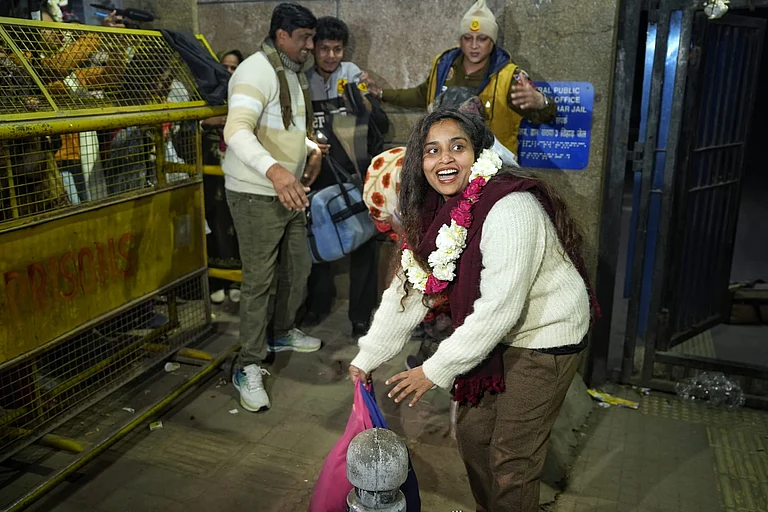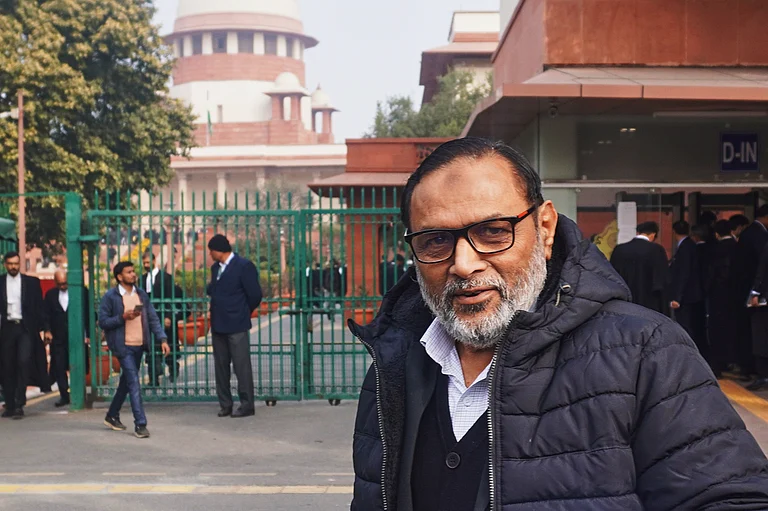Delhi Chief Minister and Aam Aadmi Party Supremo Arvind Kejriwal on Friday was granted interim bail by the Supreme Court in connection with the ED arrest in the Delhi excise policy case, however, will remain in jail due to his arrest by the CBI. Parallelly on Friday, a Delhi court extended till July 25 judicial custody of Chief Minister Arvind Kejriwal in CBI's corruption case linked to excise policy 'scam'.
The ED arrested Arvind Kejriwal in connection with a money laundering case probe linked to the now-scrapped alleged Delhi excise policy 'scam' on March 21. The AAP supremo had challenged in the top court the April 9 order of the Delhi High Court that had upheld his arrest in the case. On May 17, the bench had reserved its verdict on Kejriwal's plea.
ALSO READ | What Is The Liquor Policy Case In Which Arvind Kejriwal Was Arrested? What Next For The Delhi CM?
The Supreme Court bench, comprising Sanjv Khanna and Dipankar Datta, referred his petition challenging his arrest by the Enforcement Directorate (ED) to a larger bench. The top court framed three questions related to power and policy of arrest by the ED, and said Kejriwal will be released on interim bail in terms of the conditions in the order of May 10, according to reports.
While granting interim bail to Arvind Kejriwal, the Supreme Court on Friday said the Delhi chief minister "has suffered incarceration for over 90 days." Kejriwal is elected leader and it is up to him to decide if he wants to continue as Delhi CM, added SC while granting the AAP supremo interim bail.
The high court had upheld Kejriwal's arrest in the case, saying there was no illegality about it and that the ED was left with "little option" after he skipped repeated summonses and refused to join the investigation.
On June 20, Arvind Kejrieal was granted bail by a trial court in Delhi on a personal bond of Rs 1 lakh in the case. However, the ED had moved the Delhi High Court the next day and contended that the trial court's order granting bail to Kejriwal was "perverse", "one-sided" and "wrong-sided" and that the findings were based on irrelevant facts.
Arvind Kejriwal's Arrest | Timeline Of Key Events
After getting arrested by the Enforcement Directorate (ED) in connection with its money laundering probe linked to the alleged excise or liquor policy scam on March 21, Arvind Kejriwal was sent to judicial custody and was lodged in Delhi's Tihar jail for the same.
On May 10, the Supreme Court granted interim bail to Kejriwal till June 1 to campaign in the Lok Sabha elections, saying he will have to surrender and go back to jail on June 2
On June 20, the trial court granted regular bail to Kejriwal
June 21: The ED moves the high court challenging the trial court's bail order. The high court issues a notice on the agency's plea, suspends the bail order until pronouncement on the issue of stay
June 25: The high court stays the bail granted to Kejriwal by the trial court in the money-laundering case.
June 26: Kejriwal arrested by CBI in excise policy case
July 12: SC grants interim bail to Kejriwal in petition filed by him challenging his arrest by the ED
The high court, on June 21, imposed an interim stay on the trial court's bail order till passing of an order on ED's application for interim relief. On June 25, the high court had passed a detailed order staying the trial court order.
Kejriwal was also arrested by the CBI on June 26 in connection with the corruption case related to the alleged excise policy scam.
The ED has alleged that other accused in the case were in touch with Kejriwal for formulating the now-scrapped excise policy that resulted in undue benefits to them and kickbacks to the Aam Aadmi Party (AAP).
In his petition, Kejriwal has also challenged the constitutional validity of certain provisions of the Prevention of Money Laundering Act (PMLA) with respect to arrest, questioning and grant of bail.
The AAP on Friday described the Supreme Court order granting interim bail to Arvind Kejriwal as a "victory of truth" and "defeat of the BJP's conspiracy" against him.
The BJP, however, said the Supreme Court order was not a victory for the AAP as the court has put its "seal of approval" on Kejriwal being guilty in the excise policy case.


























